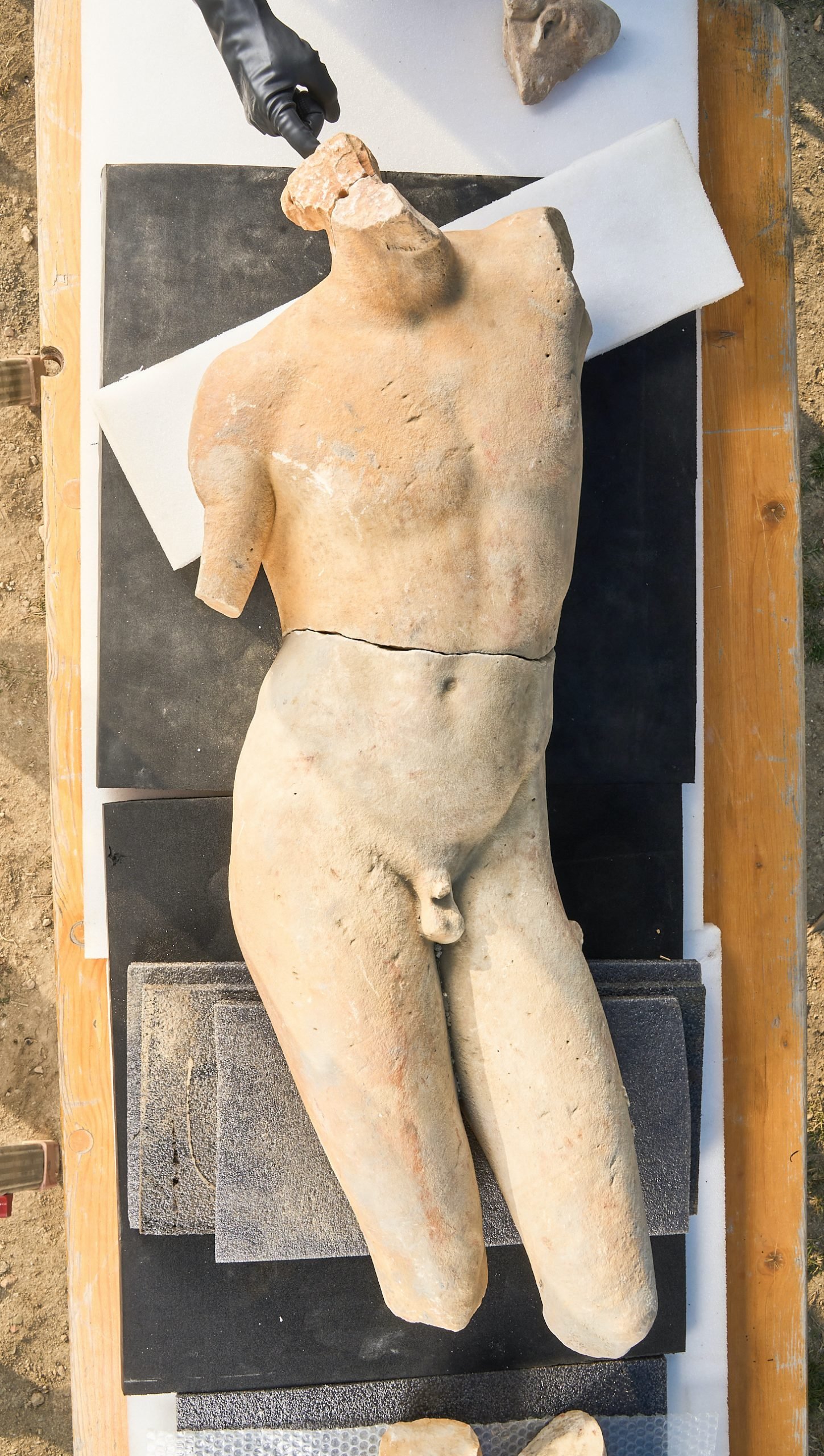
New excavations at the ancient thermal baths of San Casciano dei Bagni in Tuscany, Italy have yielded a life-sized, well-preserved statue of the mythical figure Apollo Sauroktonos—the latest discovery at a site that has already proven rich in Roman and Etruscan finds.
The marble sculpture was discovered when archaeologists broadened the perimeter of their dig area beyond the geothermal springs. At the edge of the basin, in what used to be an Etruscan-Latin sanctuary complete with a portico and four columns, the marble statue was found broken into large parts. The legs of the sculpture first emerged, before the team uncovered its torso and a small altar.
“In our arms, that marble body was so warm that it seemed alive,” one of the archaeologists, Jacopo Tabolli of the University for Foreigners of Siena, enthused to ANSA.
Archaeologists posing alongside the marble torso of Apollo. Photo: © SABAP-SI — Municipality of San Casciano dei Bagni.
Though fragmented—its arms and parts of its head have yet to be found—the Municipality of San Casciano dei Bagni has judged the statue “recomposable.” It has also been deemed a copy, quite likely of a bronze carving by Greek sculptor Praxiteles, whose famous statues of Apollo Sauroktonos depict the deity toying with a reptile, in a reference to his moniker, the Lizard Slayer.
The team has dated the statue to between second-century B.C.E. to third-century C.E., encompassing an era when the area transitioned from Etruscan to Roman rule. The period also saw the sanctuary dedicated in part to Apollo, with the god of healing serving as a central deity of a temple that bordered the hot springs. Tabolli added that lizards, with which the god is associated, have also been linked to cures for eye ailments.
However, the sculpture was probably toppled and shattered when Christianity swept the region at the start of the fifth-century C.E., leading to the temple’s closure. The team speculates that the broken pieces of the artifact, as well as a clutch of votive offerings, were then covered by the site’s fallen embankments.
The legs of the marble statue of Apollo, discovered at San Casciano dei Bagni in Tuscany, Italy. Photo: © SABAP-SI — Municipality of San Casciano dei Bagni.
Emanuele Mariotti, the excavation’s director, said in a statement: “New testimonies and finds such as the marble statue of Apollo and the bilingual temple […] tell us about art, divinity, cures, people, and above all about the encounter between Etruscan culture and the Roman world.”
The marble sculpture joins the trove of 24 bronze figures that were unearthed from the thermal baths in 2022, which included depictions of Apollo and the goddess of health Hygieia. These finds recently went on view at Rome’s Quirinale Palace, though there are plans to open a museum in San Casciano to permanently house them.
See more images from the dig below.
An aerial view of the archaeological site of San Casciano dei Bagni. Photo: Gabriele Forti.
An archaeologist at work at the site. Photo: © SABAP-SI — Municipality of San Casciano dei Bagni.
Engravings discovered at the Etruscan temple. Photo: © SABAP-SI — Municipality of San Casciano dei Bagni.
A votive offering found at the site. Photo: © SABAP-SI — Municipality of San Casciano dei Bagni.
Archaeologists with the fragments of the Apollo statue found at San Casciano dei Bagni. Photo: © SABAP-SI — Municipality of San Casciano dei Bagni.
More Trending Stories:
How an Exclusive NYC Cult Influenced the 1970’s Art Scene
A Rare Soulages Lithograph Possibly Worth $30,000 Sells For $130 in Facebook Marketplace Mishap
Masterpiece or Hot Mess? Here Are 7 Bad Paintings by Famous Artists
Is There a Hat Better Than Napoleon’s? We Rank Art History’s 5 Most Iconic Chapeaux